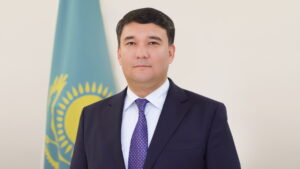ASTANA – The genomic industry in Kazakhstan is developing rapidly, drawing interest from government agencies and private investors. The integration of genomic technologies across various sectors of the economy promises to enhance the quality of life and production processes in the country.
Gabidulla Ospankulov, the chairman of the Investment Committee of the Kazakh Foreign Ministry, discussed strategic plans to attract investments in the genomic industry in an interview with 24KZ news agency.
Kazakhstan has the potential to become a center for genomic research

Gabidulla Ospankulov, the chairman of the Investment Committee of the Kazakh Ministry of Foreign Affairs. Photo credit: primeminister.kz
“Nowadays, all big companies worldwide are interested in investing in the genomic industry because many are convinced that these technologies can help address major social issues in healthcare, agriculture, and even combat desertification,” said Ospankulov.
Kazakhstan’s QazBioPharm Holding and China’s BGI Genomics recently launched the Astana Genetic Center (AGC), a genetic laboratory based at the National Center for Biotechnology. This marks a significant milestone in advancing genetic research and healthcare in the region.
The new genetic laboratory will focus on genomic sequencing, biomarker research, and developing new diagnostic and treatment methods.
“Previously, Kazakh medicine had to export biomaterials for research abroad. Today, this laboratory fully supports this activity. It identifies genetic changes, helps avoid negative consequences, and ensures accurate diagnoses. This early-stage technology is proving effective, and Kazakhstan is playing a significant role in these major scientific projects,” he said.
This is the first laboratory of its kind in Central Asia, equipped with modern equipment to conduct extensive research and train personnel for Kazakh medical institutions
“Kazakhstan has the potential to become a center for genomic research. Thanks to our relationships with large, internationally recognized companies, we are elevating our capabilities,” said Ospankulov.
Genetic solutions in other economic sectors
Ospankulov highlighted another project the Chinese BGI Group proposed that connects agriculture and ecology to address multiple issues.
“Recently, the Chinese company collected samples from the Kyzylorda Region, specifically from the Aral region, where desertification is prevalent. They previously developed and successfully applied this technology in the sands of Mongolia. Now, they aim to implement it in the Kyzylorda Region. By studying the sand’s structure and selecting the appropriate reagents, they can combat desertification by reducing its effects. Using moisture-retaining technology, a biological environment emerges, leading to the greening of these areas,” he explained.
Ospankulov emphasized that such technologies boost the country’s economy and offer significant prospects for the local population, who face environmental challenges.
He also mentioned the growing interest from international investors, including those from Arab countries, Germany, and the United States.
“A German company plans to implement a large-scale project to produce hydrogen energy. This innovative project involves establishing a joint company, and we expect to see results soon,” said Ospankulov.
Streamlining investment with digital innovation
Clearing investment obstacles and streamlining bureaucracy while ensuring transparency and a level playing field are top priorities of Kazakhstan’s new economic policy. The launch of the National Digital Investment Platform marks a significant step toward achieving these goals.
“Currently, there are 747 investment projects nationwide on the platform, valued at approximately 32 trillion tenge (US$67 billion). The implementation of these projects is expected to create 120,000 jobs. The platform was created to ensure that projects are implemented on schedule, benefiting the economy and the population,” said Ospankulov.
The platform allows investors to register projects, track their progress online, and resolve issues in one place.
“This platform is beneficial for investors as it provides round-the-clock access to monitor project stages and ensure timely completion. All government agencies will deliver their services promptly,” said Ospankulov. “For the state, it offers real-time visibility into project scales, identifying bottlenecks and systemic issues that require legislative adjustments or structural changes. This centralized view effectively eliminates bureaucracy and provides transparency for all stakeholders.”
Facing challenges
Discussing the challenges in attracting investments, Ospankulov identified infrastructure deficiencies and the underdevelopment of special economic zones (SEZs). Kazakhstan has 14 SEZs with different industry focuses.
“Investors are raising concerns about the lack of infrastructure—such as water, electricity, and roads—necessary to build plants. The government has allocated 200 billion tenge (US$419 million) this year to improve regional infrastructure, opening new small industrial zones. This infrastructure development is crucial for attracting and landing large investments,” he said.
He added that the state supports investors through public-private partnerships or by reimbursing infrastructure costs.
“The underdevelopment of SEZs is another challenge. Investors prefer entering SEZs due to the favorable conditions and tax preferences offered. Kazakhstan needs to adopt international best practices and develop SEZs to world standards,” said Ospankulov.


